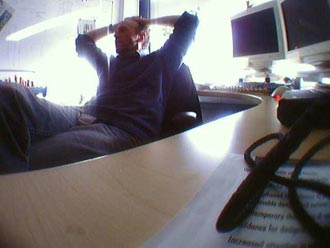Another interesting piece from Tech Crunch, this time on the concept of life recorders – digital equipment that records a continuous video and audio stream of your activities, with a GPS cherry on top. The concept is one that seems ludicrous to many, but surprisingly acceptable to a growing number. There are a number of companies already developing such technology, such as Microsoft’s SenseCam, and it will only be a year or two until we see the first commercially available product.
Just who, exactly, is going to wear an object that records every moment of their movements? Well, beyond the obsessive historians and those with a need for future generations to be interested in them, there are some more practical applications that will be quite useful. However, there are also some frightening implications of such technology that we need to look out for.
Imagine how this could change the nature of journalism. It’s like a souped up spycam with enough storage to cover an entire day’s events. It will also make for some interesting art projects, and could even be of great use anthropologically and sociologically to gather accurate data about a volunteer subject. Many people see this as a way to record their activities for prosperity, so that future ancestors could gain an insight into their lives.
But the question still remains, would you wear one on a day-to-day basis?
Tech Crunch asked this question, and so far have had over 2,500 responses with an almost exactly 50/50 split. Unlike a few years ago – when many of us were very concerned about electronic storage of our daily activities – social networking and the prevalence of the internet has desensitised many of us to broadcasting our lives to a wider audience.
It seems like there are a lot of people out there who want their movements recorded for one reason or another. However, there is an ethical issue surrounding the privacy of those you record and their wishes. As an extension of this thought, the worrying thing is how such technology might be incorporated into society against our personal desires. More importantly, would we even be able to notice the transition?
Particularly in areas of the globe where there is already a great deal of government surveillance, it is not too difficult to imagine a future situation where one would be under direct suspicion if such a device was ever removed from your person or switched off.
So at what point would we be able to see this technology transform from the useful, if a bit of a novelty in many areas, to a tool for the erosion of personal privacy? Well, I’ve got a thought on that matter.
A tipping point to look out for is when such devices replace the common ankle monitors (also known as ‘tethers’) that are often used for individuals placed under house arrest or other forms of restricted movement or curfew.
These devices already utilise a GPS component that sends out location data at regular intervals, and it isn’t that hard to imagine that in the near future they will also send out sensory data as well. This is the moment to watch out for, and I am almost certain that it will arise at some point.
What seems like an interesting novelty, with some useful practical applications, could also be used for a new form of super-surveillance. As a general rule, we as a society are happy for criminals of a particular order to endure loss of liberty and privacy rights – but will that line slowly move ever closer to home?
It’s certainly worth thinking about…
[ad name=”Google Adsense-Link Banner x4″]





